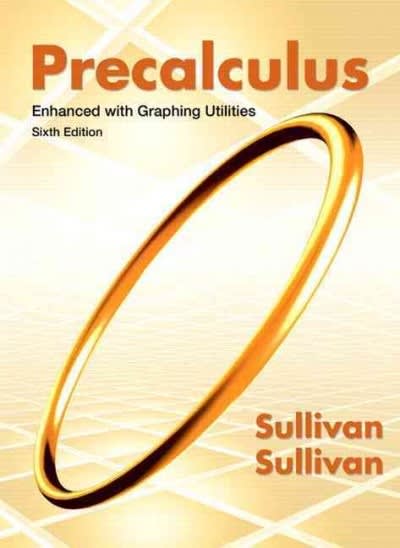Question
1. What is the parameter of interest to compare the proportions from two populations? 1 Point a. p1+ p2 b. p1- p2 c. p1+ p2
1. What is the parameter of interest to compare the proportions from two populations? 1 Point
a. p1+ p2
b. p1- p2
c. p1+ p2
d. p1- p2
e. 1+2
f. 1-2
2. True or False: When both the explanatory and response variable are categorical and each has only two possible categories, we compare two proportions. 1 Point
a. True
b. False
3. The following scenario applies to questions 3-10:
Some people have a condition called hyperhidrosis where they produce four to five times the amount of sweat compared to people without this condition. Doctors tested whether Botox, a weakened form of the food-poisoning toxin botulism that is used to treat wrinkles, reduced sweating. They randomly assigned 322 subjects who have hyperhidrosis to receive underarm injections of either Botox or salt water. One month later, subjects were asked whether they experienced a reduction in sweating. The results of this experiment are given in this table:
What is the research question? 1 Point
a. Is the mean number of patients treated with Botox who have sweat reduction greater than the mean number of patients treated with salt water who have sweat reduction?
b. Is the number of patients treated with Botox who have sweat reduction greater than the number of patients treated with salt water who have sweat reduction?
c. Is the proportion of patients treated with Botox who have sweat reduction different from the proportion of patients treated with salt water who have sweat reduction?
d. Is the proportion of patients treated with Botox who have sweat reduction greater than the proportion of patients treated with salt water who have sweat reduction?
4. What are the appropriate hypotheses to test whether Botox reduces sweating? Let B = Botox and P = placebo salt water. 1 Point
a. H0: pB= pPversus Ha: pB< pP
b. H0:pB=pPversus Ha:pB<pP
c. H0: pB= pPversus Ha: pB> pP
d. H0:pB=pPversus Ha:pB>pP
5. What is pB, the proportion of patients treated with Botox who had a reduction in sweating? 1 Point
a. 0.750
b. 0.506
c. 0.253
d. 0.186
6. What is pp, the proportion of patients in the salt water group who had a reduction in sweating? 1 Point
a. 0.750
b. 0.506
c. 0.253
d. 0.186
7. What is the pooled sample proportion p, the proportion of subjects who had a reduction in sweating? 1 Point
a. 0.750
b. 0.506
c. 0.253
d. 0.186
8. The difference (pB - pp) = 0.497 and the standard error of (pB - pp) is 0.0557. What is the value of the standardized test statistic? 1 Point
a. 8.923
b. 5.50
c. 1.36
d. 0.233
9. Suppose that the p-value is 0.0002. At = 0.01, can you conclude that the proportion of patients having a reduction in sweating after receiving Botox is greater than the proportion of patients having a reduction in sweating after receiving salt water injections? 1 Point
a. Yes, because we can reject the null hypothesis.
b. Yes, because we fail to reject the null hypothesis.
c. No, because we fail to reject the null hypothesis.
d. No, because we can reject the null hypothesis.
10. A 90% confidence interval for the difference between the proportion having a reduction in sweating after receiving Botox injections and the proportion having a reduction in sweating after receiving salt water injections was found to be (0.417, 0.577). Does this confidence interval allow us to say that the two proportions differ significantly at = 0.10? 1 Point
a. Yes, because the confidence interval includes 0.
b. Yes, because the confidence interval does not include 0.
c. No, because the confidence interval includes 0.
d. No, because the confidence interval does not include 0.
Step by Step Solution
There are 3 Steps involved in it
Step: 1

Get Instant Access to Expert-Tailored Solutions
See step-by-step solutions with expert insights and AI powered tools for academic success
Step: 2

Step: 3

Ace Your Homework with AI
Get the answers you need in no time with our AI-driven, step-by-step assistance
Get Started


